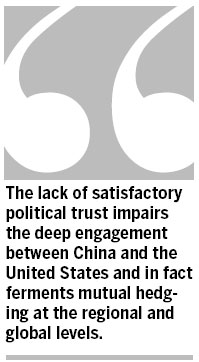
US must honor 'One China' principle and China's sovereignty, and both sides should dispel hegemony for the benefit of all
Forty years ago, China and the US made epoch-making contact when former US president Richard Nixon paid an unprecedented visit to China at Beijing's invitation.
At that time, the two powers were entangled ideologically and strategically, and Beijing and Washington were confronting various issues ranging from Taiwan to Vietnam. Both were strategically mired - China was plagued by internal chaos and the US was deeply trapped in Southeast Asia.
However, China and the US both faced the common threat of Soviet expansionism. The Soviets stationed 1 million troops along China's northern border, and the US felt no less security pressure because of the Soviet military presence in East and Central Europe as well as the West Pacific.
In 1971, the two countries seized the chance to engage in what has become known as Ping-Pong diplomacy, when the 31st International Tournament of Table Tennis in Nagoya, Japan, presented the opportunity for China to invite the US team to visit the People's Republic. The success of their visit, and the subsequent visit to the US by a Chinese team, precipitated former US secretary of state Henry Kissinger's secretive trip to Beijing that fall, followed by Nixon's historic visit across the Pacific in the chilly February of 1972, which consequently reshaped the world political landscape.
Nixon's visit attained its climax when China and the US issued their famous Shanghai Communiqu. Since its inception, this communiqu has formed the cornerstone of contemporary Sino-US relations, and is a foundation for peace and stability in the Asia-Pacific region. Though four decades have elapsed, its spirit has continued to inspire the successive generations of both nations to carry on its legacy.
Through the Shanghai Communiqu, China and the US succeeded, in the early 1970s, in forging a strategic consensus between the two countries to jointly seek peace and stability by countering hegemony. Despite their vast ideological gap, China and the US agreed that they shared fundamental interests in peace and stability in the region and aspired to collaborate toward this end.
With the Shanghai Communiqu, China and the US successfully demonstrated the wisdom of their diplomacy by openly agreeing to disagree. The document allowed each party to elucidate its distinct Asia-Pacific policies. It comes as no surprise that after confronting each other for more than two decades, China and the US disagreed on various issues and how they should be handled.
The world has experienced a sea change since the Shanghai Communiqu, and the threat of the Soviet Union, which brought China and the US together, has disappeared. However, the spirit of the Shanghai Communiqu has continued and China and the US have continued to cooperate to counter new common threats such as terrorism, the proliferation of nuclear weapons and the global financial crisis.
The world today is much different from what it was 40 years ago. In addition to the demise of Soviet Union, the Vietnam War that used to divide China and the US has ended, and since the late 1970s China has embarked on its path of reform and opening-up and reaped remarkable economic achievements through international collaboration.
However, the Shanghai Communiqu left the issue of the US arms sales to Taiwan unresolved, and, though both China and US stressed the "One China" principle in it and the two following communiqus, the US has continued to intervene in China's domestic affairs by selling weapons to the island, which harms trust-building between China and the US.
After Vice-President Xi Jinping's visit to the US, overall bilateral relations will be much broader and deeper than they were 40 years ago. China and the US are now collaborating on a more balanced footing on various regional and global matters. Nevertheless, the lack of satisfactory political trust impairs their deep engagement and in fact ferments mutual hedging at the regional and global levels.
While commemorating the 40th anniversary of the Shanghai Communiqu, great leadership is needed to further substantiate the communiqu. The US should honor the "One China" principle and fully respect China's sovereignty, and both nations should open a new page in their relations by having the courage to dispel hegemony for the common good of all.
The author is a professor and director of the Center for American Studies at Fudan University in Shanghai.
(China Daily 02/13/2012 page8)